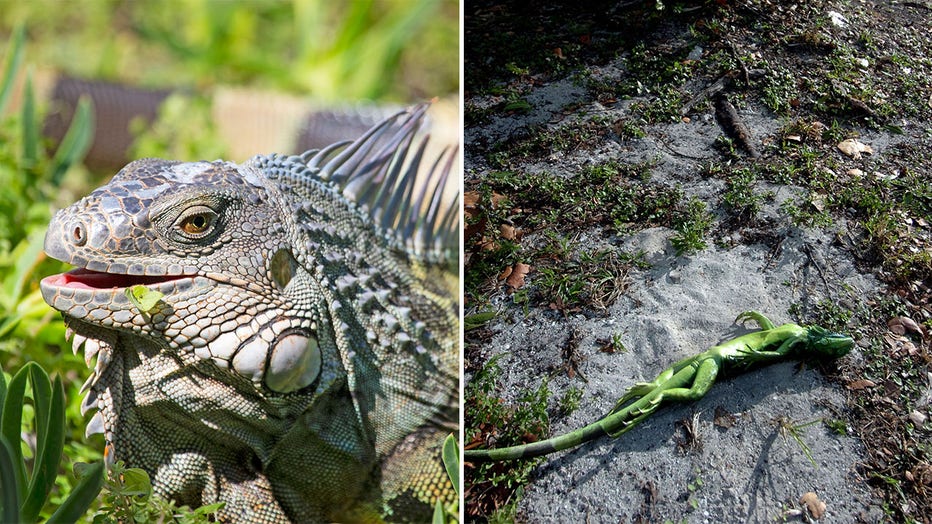Cold-stunned iguanas become immobile across South Florida as temperatures dropped Christmas weekend
Cold-stunned iguana in South Florida during Christmas 2022 weekend. (Photo from Rick Rincon)
MIAMI-DADE COUNTY, Fla. - When temperatures fall, so do iguanas.
Down in South Florida, it happened again. Video captured by Rick Rincon in Miami-Dade County shows an immobile reptile resting in green grass and blending in with its surroundings.
Once temperatures drop to the 40s, they become immobile and therefore, could fall out of trees. Wildlife experts say you shouldn’t touch them. Eventually, they’ll warm back up and move again.
"Never take cold-stunned iguanas into your home! These are wild animals and may act defensively once they warm up and recover," according to the Florida Fish and Wildlife Conservation Commission.

Iguanas are cold-blooded and when the temperatures drop, the normally tropical reptiles slow and can become cold-stunned. The iguanas go into a sort of suspended animation mode, causing them to fall to the ground if they happen to be hanging out in the trees.
This drastic change in weather is not particularly harmful to iguanas, said Fox News Senior Meteorologist Janice Dean.
Zoo Miami Communications Director Ron Magill said the temperatures need to be below 50 degrees constantly to slow an iguana considerably.
Cold-stunned iguanas fall from trees in South Florida
Iguanas are called cold-blooded for a reason. Over the weekend, Floridians were told to watch out for iguanas during the cold snap. This man in Fort Lauderdale captured video of an iguana that was in the middle of defrosting.
"Though there have been instances when temperatures have dropped low enough for an extended period of time where iguanas are stunned, it is not a regular occurrence," Magill said.
Iguanas are not otherwise dangerous or aggressive to humans, and they are allowed to be kept as pets. They have existed in the southern part of the state since the 1960s and prefer the tropical climate of South Florida, the Caribbean, and Central and South America. They have caused damage to infrastructure, including seawalls and sidewalks, according to agencies in charge of managing the hundreds of miles of canals that channel water throughout South Florida.
According to the Florida Fish and Wildlife Conservation Commission, the first reports of lizard-like reptiles started in the 1960s around Miami-Dade County. The Florida iguana population has continued to grow, expanding as far north as St. Lucie County and along the Gulf Coast. Green iguanas can grow up to five feet and weigh close to 20 pounds. Female iguanas can lay nearly 80 eggs a year.

